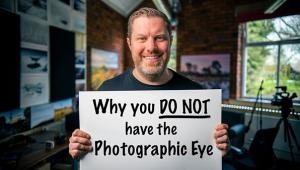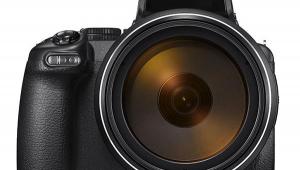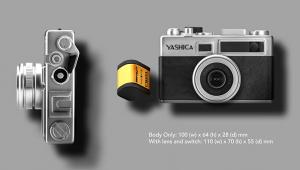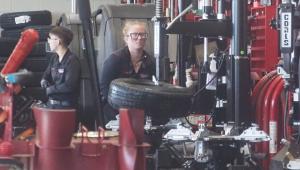Megapixels Don’t Matter and Other Photography Myths that Need an Exorcism
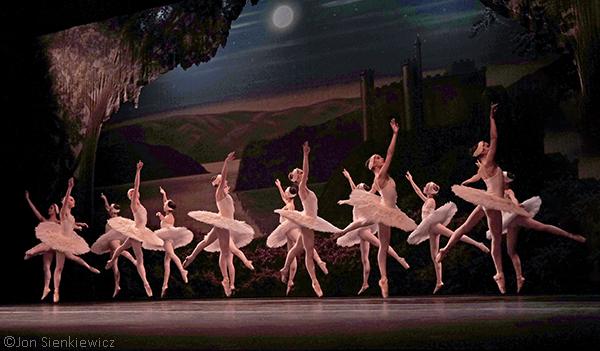
I’m tired of hearing people mindlessly repeating nonsensical assumptions as though they were true facts. You and I may disagree on some of these points, and that’s fine—I certainly don’t know everything. But I have been around long enough to still practice that old maxim, “Believe nothing you hear and only half of what you see,” which in a world that has a fascination with the internet becomes, “Don’t believe nothin’ ‘til you’ve checked it fer yourself.”
Stop spreading unsupportable generalizations. That’s a polite request, not an accusation. We’ve all been guilty of it. Whether we are repeating things we’ve picked up from questionable sources online or just simply misunderstanding the data, we all say things without knowing whether or not they are really true. Sometimes we do it to show that we’re the smartest. And sometimes it proves that we are the dumbest.
In fairness to the offenders, it’s not entirely their fault. Some of the verbal rubbish is created by sinister marketing geniuses to overstate the meager features of their products—or to counteract the deficiencies that lie therein. They call it “hyperbole” to justify it, but I call it bullslop. It’s litter, and it’s scattered along both sides of the Information Highway.

True: It’s Good To Be A Fanboy
I’m agnostic when it comes to camera and lens brands. Ecumenical is a better adjective, but I’m not sure how to spell it. As a writer in the photo industry, it’s good to be impartial and not have favorites. But as a consumer, it sucks.
If I were a fan of one and only one brand, I wouldn’t suffer a hankering case of the “I wants” everytime a new something comes along. I wouldn’t have divided my meager budget 17 different ways to support multiple lens systems—instead I’d have several lenses that fit only one mount.
So if anybody calls you a “Fanboy” (or Fangirl, I guess) because you have already preordered the new Fujifilm X-T4, tell them to go pound sand. (That’s pound, not hashtag.) Being a one-brand-man means you can spend more efficiently on your hobby.
 True: Pro Cameras Are Better Than Amateur Cameras
True: Pro Cameras Are Better Than Amateur Cameras
Many years ago I hit a half-gallon milk carton with a bow and arrow from a distance of 50 yards. True story. The person who witnessed my marksmanship adroitly said, “Anyone can do something once. Let’s see you do it again and again.”
To make a long story short, the next several dozen shots landed no closer than 10 feet from the target. More like 20 feet, but it was windy.
My point is that anyone can take any camera and go out and create some magnificent images. But to do it over and over and over, under all sorts of conditions, and in various situations, requires a camera that’s up to the task.

True: Five Star Ratings Mean Zip
Most amateur reviewers mean well, I suppose. Sometimes they hit the mark, but more often they don’t. How can you know who’s qualified to evaluate a product and who is not? You can’t.
And sadly, some reviews are bogus—bogus as in written by professional review writers who are compensated either with cash or products to create and post phony positive reviews. That’s not Snake Oil, that’s Consumer Fraud.
We fall prey to this because many of us, this writer included, sometimes welcome a little push to help us justify making a purchase. Reading and believing a positive review gives us that extra bit of rationalization we need to get over the last buying barriers. One day sale. Limited quantity. They won’t last long at these prices.
When we read a sterling review after we make the buy, it confirms our good judgment. One of the major roles played by all advertising is reassuring us that we made the right buying decision. Just make sure that the leap you take isn’t guided into an endless pit of frustration and disappointment by a phony, fraudulent review.
My advice is to value the reviews written by consumers with a gigantic grain of salt. More like a Five Star ton of salt. An overwhelming number of positive or negative reviews may indicate a trend, but keep an open mind and read what credentialed professional reviewers have to say, too.

True: Professional Photographers Are Better Than Amateurs
There are many, many truly outstanding amateurs just as there are some absolutely lousy professionals. But by and large, pros are better than hobbyists. I’m not talking about you—you might be Picasso with a Pentax for all I know.
After all, there is a natural weeding-out process. A professional photographer’s abilities are tested and scored every single day—by their customers. Plus, professionals rely on their talents to eat regularly and live under a roof. That’s one hell of an incentive to improve—or get out. And even those with only meager skills in the beginning improve with practice.
Here’s the root of the discrepancy. Somewhere along the line the word “professional” was subverted to imply “highly accomplished.” Or maybe it was vice versa. Anyway, amateurs classify themselves as pro or semi-pro to indicate that they deserve the same status as those who earn their daily bread via photography. You can see the disconnect.
Amateur, by definition, means someone who does something because they love it. That best describes me and probably you, too.

True: Prime Lenses Are Not Always Better Than Zooms
There was a time when primes (single focal length lenses) shot rings around zooms, metaphorically speaking, just as there was a time when bicycles were faster than automobiles.
Today there are many zoom lenses that are far superior to some primes. How do I know? I use both types quite extensively and compare.
Yes, there are some primes that are better than any zoom, and prime lenses often have other beneficial attributes like faster maximum apertures and faster focusing. Just keep in mind that when you choose a prime over a zoom you surrender the ability to change image composition without changing the distance between you and the subject. Zooms let you crop in the camera, so to speak. For many people, that alone makes zooms better than primes.

True: Megapixels Do Matter
I’m really tired of this argument. All else being equal, which would you rather have, a perfectly exposed and richly saturated, grain-free image from a 60-megapixel sensor or the same image from a 12-megapixel sensor?
Sure, the 12-megapixel shot might be great and might be more than enough for your needs. I still use some 6-megapixel DSLRs that I revere and still get results I’m very proud of. But in the final analysis, a higher resolution shot is better over the long term and more suitable for a wider variety of output options, today and in the future (when I get that 84-inch TV for $399).
The confusion, I think, comes from the fact that some people believe that having more megapixels automatically makes one camera better than another. That certainly is not true, and it’s not what I’m asserting here.
In fact, sometimes adding pixel density (i.e., more pixels) to a sensor without increasing its size results in more noise and lower overall quality. This especially is true with small compact digital cameras that contain a 1/2.5-inch sensor or something close to that. If you add more pixels without increasing field size, the distance between the pixels obviously must decrease. That promotes noise and other problems.
When I look back on two decades worth of digital images, there are many shots that I wish had been taken with a higher resolution camera. That’s all I need to know that megapixels do matter.
Conclusion
Disagree with me? Great! I love a good argument. Without disagreement there cannot be progress. I’m not so smug that I think I’m always right. Maybe you have a point of view I haven’t considered. I’d love to hear your opinions and comments. You can even call me bad names—I’m about as sensitive as a kitchen sponge—just don’t put it writing. So don’t just sit there sputtering and festering—tell us what you think!
—Jon Sienkiewicz
- Log in or register to post comments
